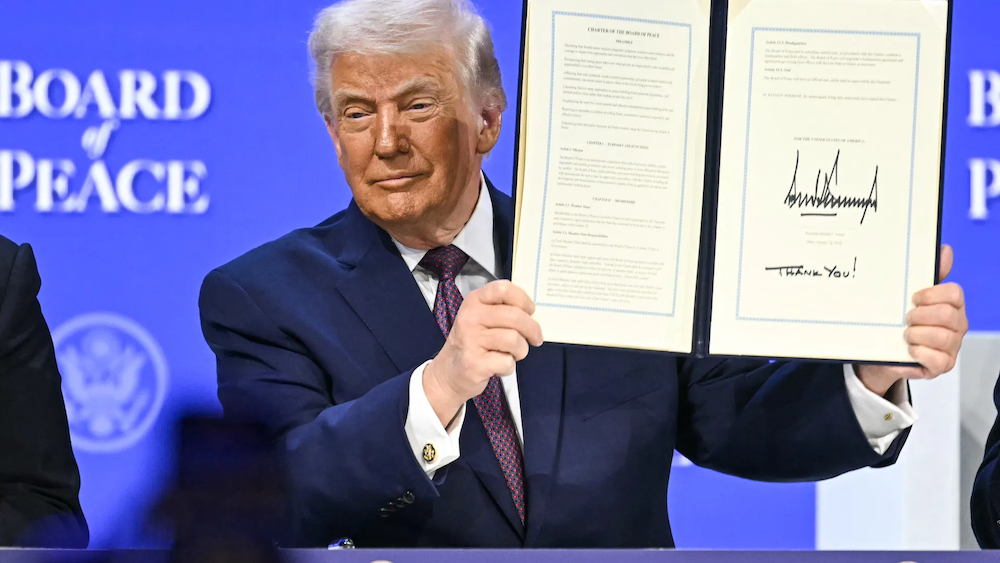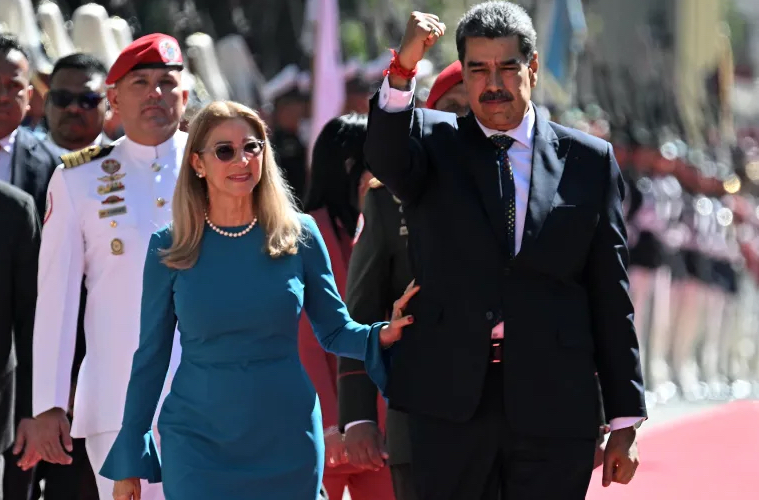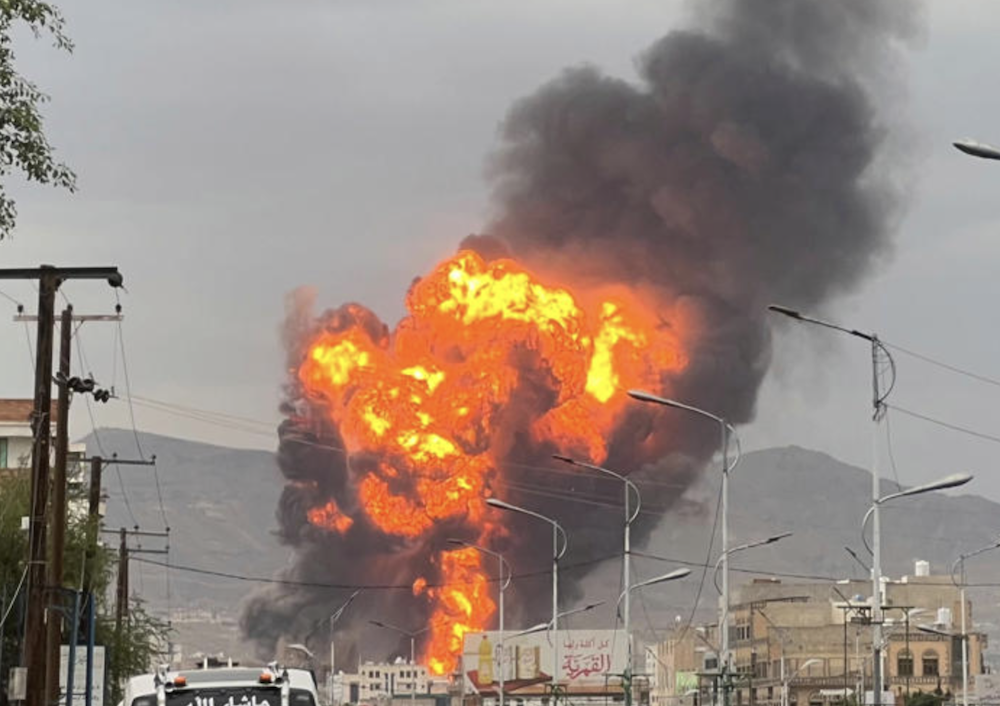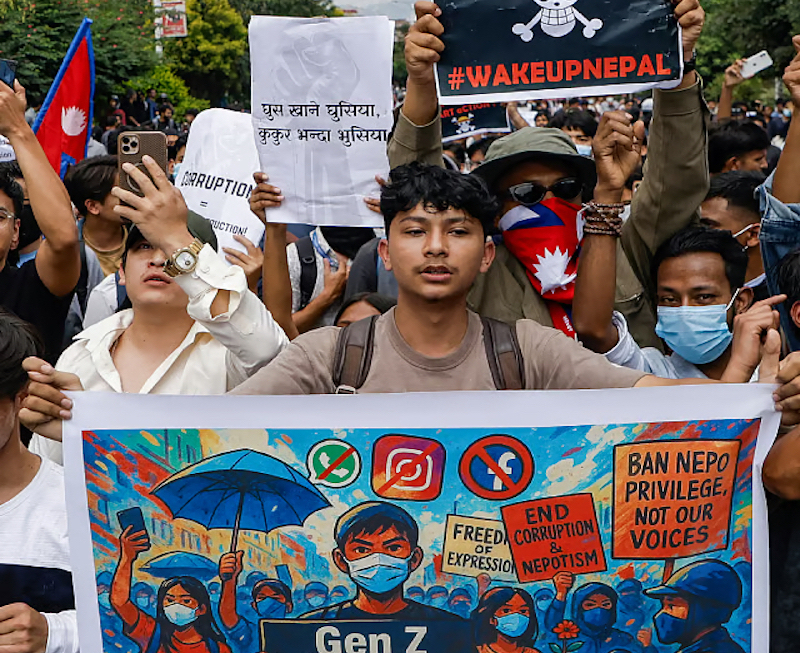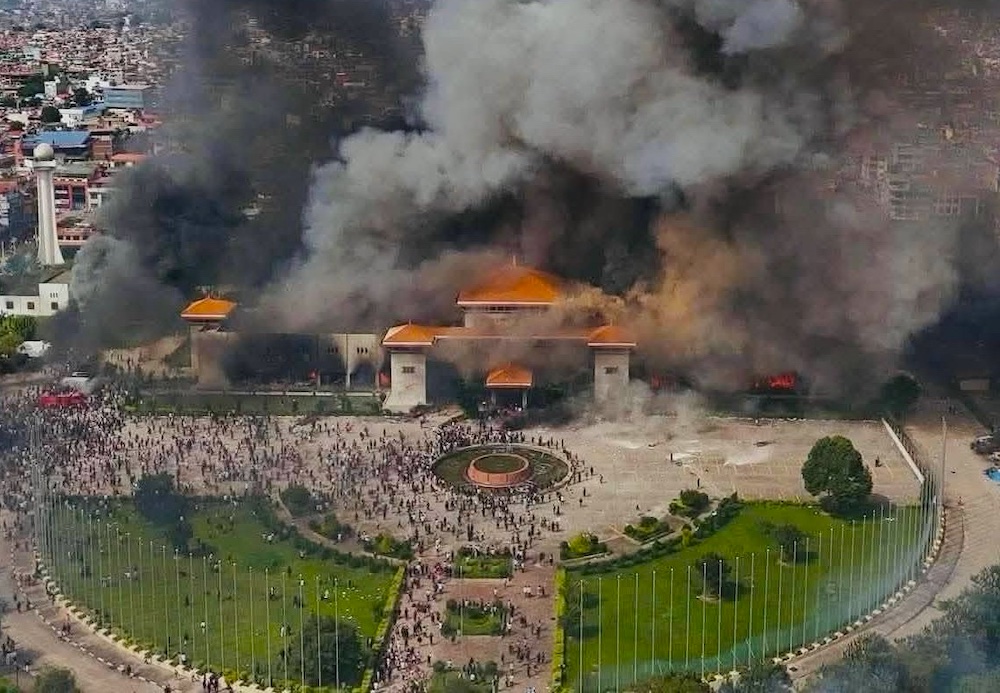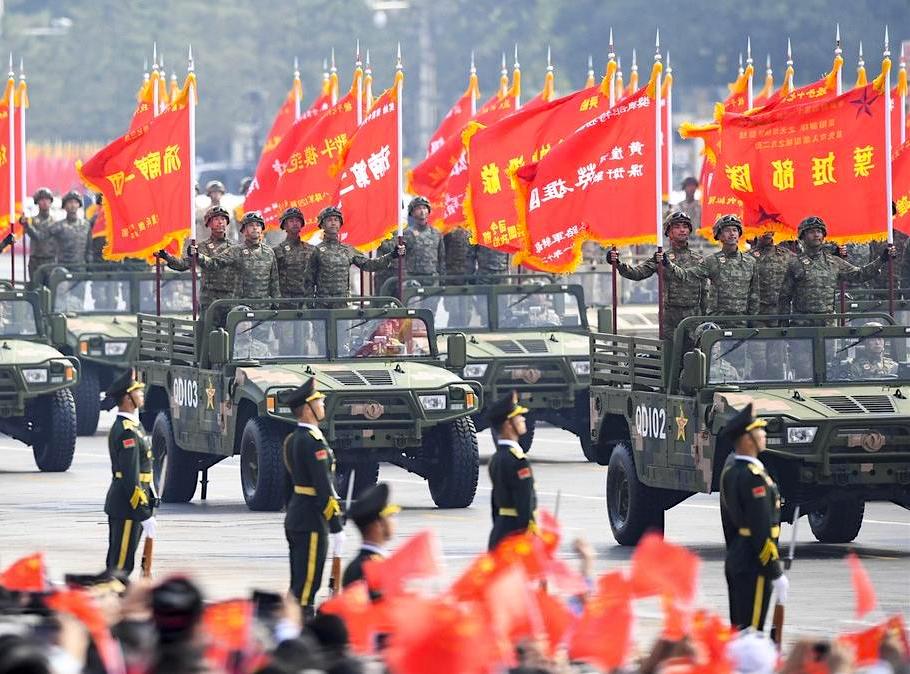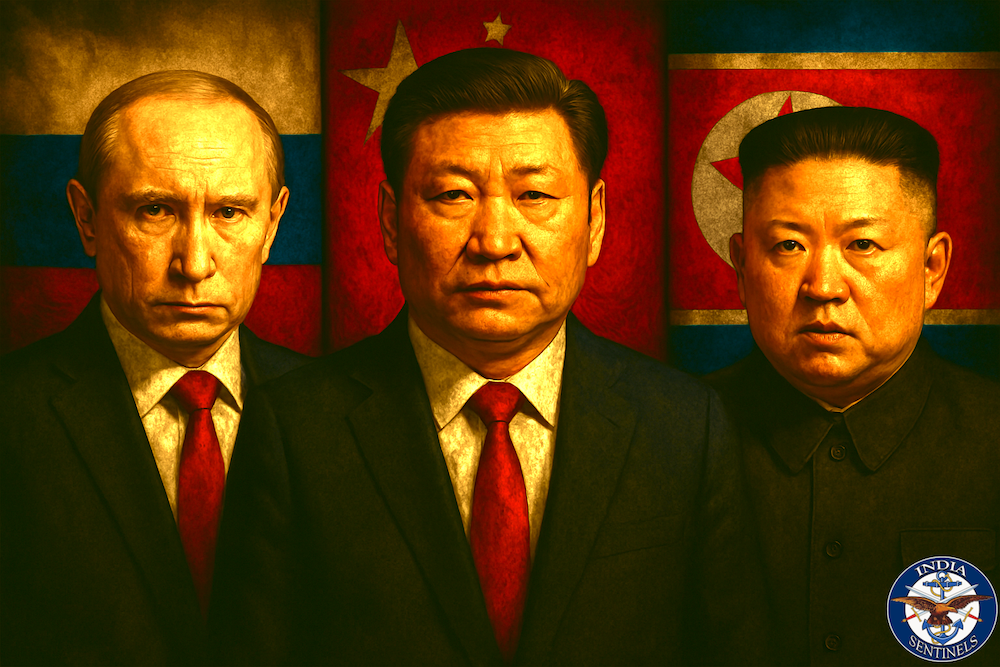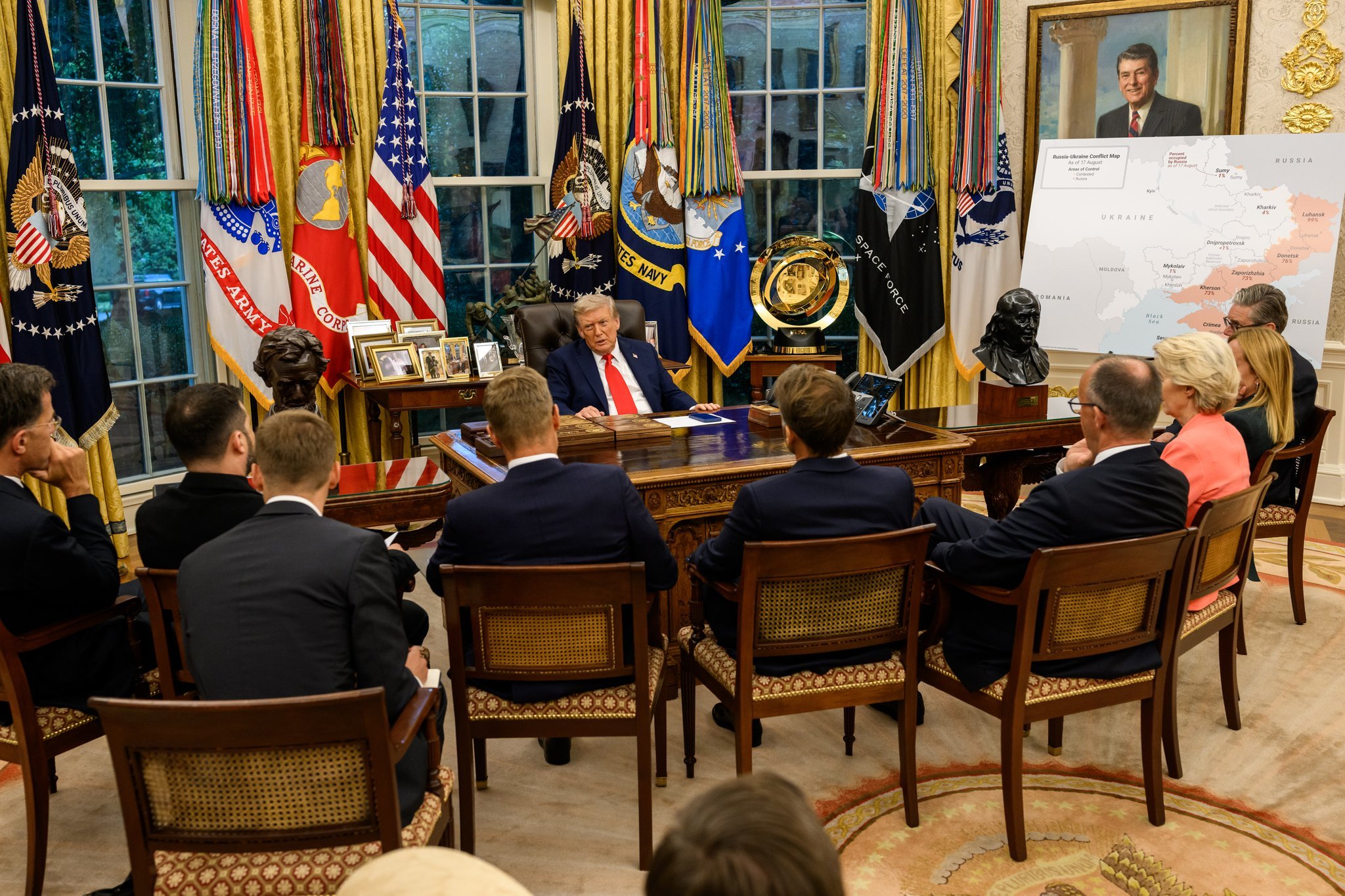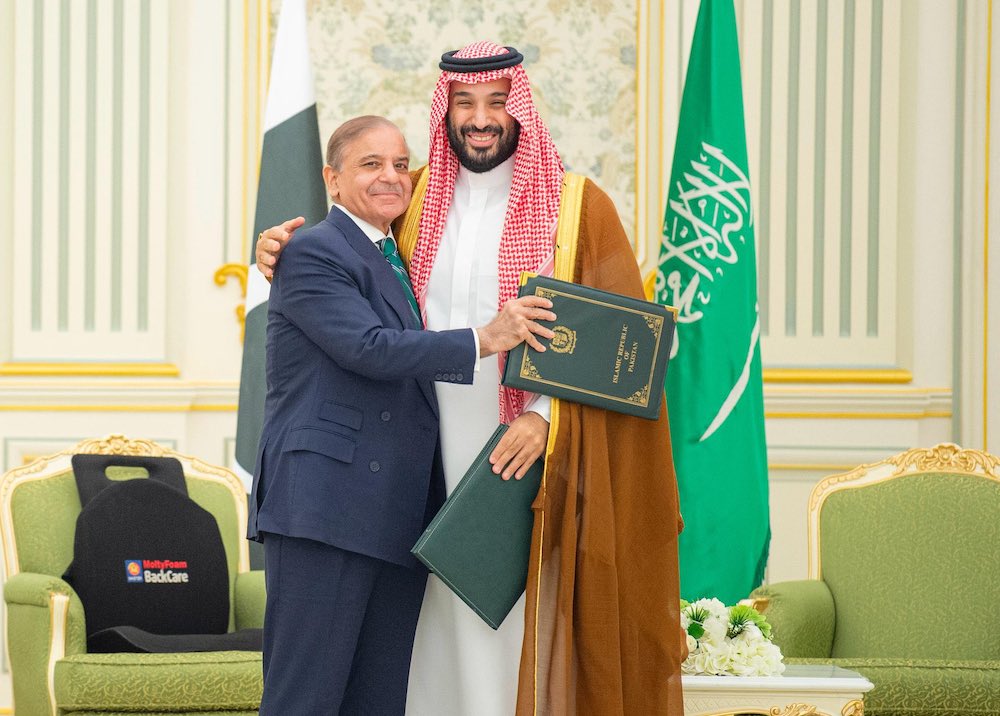 Shehbaz Sharif (L) and Mohammed bin Salman after signing the mutual defence pact. (Photo: Saudi Arabia official release)
Shehbaz Sharif (L) and Mohammed bin Salman after signing the mutual defence pact. (Photo: Saudi Arabia official release)
New Delhi: Saudi Arabia and Pakistan have signed a landmark defence agreement that radically alters the Middle Eastern security landscape and marks the first Nato-style defence pact between a Gulf-Arab nation and a nuclear-armed state. The agreement – Strategic Mutual Defence Agreement (SMDA) – formalized on Thursday, declares that “any aggression against either country shall be considered an aggression against both”– a commitment that effectively extends Pakistan’s nuclear umbrella to the kingdom.
The pact was signed during the state visit of the Pakistani prime minister, Shehbaz Sharif, to Riyadh, with the Saudi crown prince, Mohammed bin Salman, presiding over the ceremony. The presence of Pakistan’s army chief, Field Marshal Asim Munir, underscored the military’s endorsement of this strategic commitment, which now institutionalizes decades of informal defence cooperation at a particularly volatile moment in regional geopolitics.
Strategic Timing
The agreement’s timing is significant, coming just nine days after Israel’s controversial airstrike in Doha that targeted Hamas leaders during ceasefire negotiations on September 9. This attack sent shockwaves across the Arab world, highlighting perceived inadequacies in traditional US security guarantees for Gulf states and accelerating the search for alternative security arrangements.
Saudi officials have confirmed that the pact constitutes “a comprehensive defensive agreement that includes all military capabilities” – language that suggests nuclear deterrence capabilities are integral to the arrangement. For Riyadh, this represents a calculated response to Iran’s expanding regional influence, persistent Houthi attacks from Yemen, and the kingdom’s Vision 2030 economic diversification programme, which requires sustained stability.
Pakistan’s motivations centre on securing vital Saudi investment and funding during severe fiscal strain. The agreement reinforces Islamabad’s position as a pan-Islamic security provider while potentially enabling the purchase of US weapons systems with Saudi funding – a development the Trump administration appears willing to facilitate, according to former Pakistani ambassador to the US Husain Haqqani.
Historical Foundations
The Saudi-Pakistan relationship spans nearly eight decades, which is rooted in shared Islamic heritage and complementary strategic capabilities. Saudi Arabia was among the first nations to recognize Pakistan’s independence in 1947, with both countries entering a friendship treaty (Pakistan-Saudi Arabia Treaty of Friendship) by 1951 that established extensive political, military, and economic collaboration frameworks.
Military cooperation has remained the relationship’s cornerstone. Since 1967, Pakistan has trained over 8,000 Saudi military personnel, with Pakistani forces deployed multiple times to provide security and training. The 1982 Pakistan-Saudi Arabia Bilateral Security Cooperation Agreement formalized Pakistani force stationing on Saudi soil, including special forces who assisted during the 1979 Grand Mosque seizure in Mecca.
Economic ties have proven equally robust. Saudi Arabia remains Pakistan’s largest petroleum supplier and a major financial assistance provider. The kingdom supported Pakistan during economic crises with a $6 billion aid package secured by the former prime minister, Imran Khan, in 2019 – four times larger than previous assistance. Pakistani workers in Saudi Arabia send approximately $27 billion annually in remittances, nearly matching Pakistan’s total exports for 2022-23.
Strategic Challenges for India
India’s measured response indicates serious concern about the pact’s implications. The External Affairs Ministry spokesman, Randhir Jaiswal, stated that India would “study the implications of this development for our national security as well as for regional and global stability”, and emphasized the government’s commitment to “protecting India’s national interests and ensuring comprehensive national security in all domains”.
The pact poses multiple strategic challenges for New Delhi. It provides Pakistan with enhanced political backing and potential financial cover that could embolden Islamabad in future confrontations, coming at a particularly sensitive time following the brief but intense India-Pakistan conflict in May 2025. During Operation Sindoor, both nuclear-armed nations engaged in four days of missile and drone exchanges before agreeing to a cessation of hostilities.
Former ambassador Kanwal Sibal characterized the pact as a “grave misstep” by Saudi Arabia, arguing that the kingdom risks outsourcing its security to “a nuclear-armed state hostile to India.” He warned that Pakistan and affiliated groups could feel emboldened to escalate tensions, noting that “funds will flow from Saudi Arabia to Pakistan to strengthen its armed forces”, which India will inevitably construe as a threat.
The agreement complicates India’s expanding relationship with Saudi Arabia. The prime minister, Narendra Modi, has made three visits to the kingdom since 2016, with both countries establishing the India-Saudi Arabia Strategic Partnership Council in 2019 and adding a ministerial committee on defence cooperation in April 2025. India has secured defence export deals worth $225 million with Saudi Arabia and participates in joint naval exercises.
The India-Middle East-Europe Economic Corridor (IMEC) faces potential complications from this new Saudi-Pakistan alignment. IMEC, signed during the G20 summit in September 2023, involves India, Saudi Arabia, UAE, EU, France, Germany, Italy, and the US in developing integrated infrastructure connecting Asia to Europe. The corridor aims to reduce logistics costs by 30 per cent and transportation time by 40 per cent compared to existing Suez Canal routes. However, Saudi Arabia’s deepened defence ties with Pakistan could create diplomatic tensions complicating IMEC’s implementation.
Nuclear Dimensions
The nuclear aspect of Saudi-Pakistan relations has long attracted speculation and concern. Multiple intelligence sources suggest Saudi Arabia financially supported Pakistan’s nuclear weapons development with the understanding that the kingdom could access nuclear technology if needed. A 2013 BBC investigation [archived link] revealed intelligence sources believed nuclear weapons made in Pakistan on Saudi Arabia’s behalf were “sitting ready for delivery.”
Former Israeli military intelligence chief Amos Yadlin stated in 2013 that if Iran obtained nuclear weapons, “the Saudis will not wait one month. They already paid for the bomb; they will go to Pakistan and bring what they need to bring.” While both countries deny formal nuclear sharing agreements, the current defence pact’s language about “all military capabilities” suggests this arrangement remains operationally relevant.
For India, this nuclear dimension adds complexity to regional deterrence calculations. While India maintains its own nuclear deterrent and has no direct territorial disputes with Saudi Arabia, enhanced Saudi-Pakistani nuclear cooperation could alter South Asia’s strategic balance. The pact potentially provides Pakistan with additional resources to modernize its nuclear arsenal while giving Saudi Arabia nuclear protection against regional rivals, particularly Iran.
Regional Implications
The Saudi-Pakistan defence pact represents a significant shift in Middle Eastern security architecture away from traditional US-centric arrangements toward more diverse partnerships. The agreement signals to Washington that its allies are prepared to forge alternative security relationships if American guarantees prove insufficient.
For China, the development presents both opportunities and challenges. Beijing maintains strong relationships with both Saudi Arabia and Pakistan through the Belt and Road Initiative (BRI) and China-Pakistan Economic Corridor (C-PEC). The deepened Saudi-Pakistan partnership could enhance Chinese influence in both regions while potentially complicating China’s relationships with other regional powers, including India and Iran.
The pact also affects Israel’s strategic calculations. While not explicitly mentioned in the agreement, the timing following Israel’s Qatar strike suggests the pact serves partly as a deterrent against further Israeli military actions in the Gulf. Israel’s normalization efforts with Arab states through the Abraham Accords could face additional complications from this new security arrangement.
The defence pact is expected to accelerate economic cooperation between Saudi Arabia and Pakistan. Saudi investments in Pakistan’s infrastructure, energy, and mining sectors are likely to increase, with the kingdom planning nearly $1 billion investment in Pakistan’s Reko Diq mining project. Current bilateral trade volume of $5.7 billion could expand significantly under enhanced security cooperation.
However, the agreement may complicate Saudi Arabia’s investment relationships with other regional partners, particularly India. Indian businesses and strategic planners will need to assess whether Saudi Arabia’s deepened ties with Pakistan affect investment flows and economic partnerships. This uncertainty could slow progress on major initiatives like IMEC and bilateral trade expansion.
Strategic Recalibration
The Saudi-Pakistan defence pact marks a watershed moment in regional security arrangements that will likely inspire similar partnerships among nations seeking alternatives to traditional great power guarantees. For India, the pact necessitates a recalibration of its Middle Eastern strategy to balance growing ties with Gulf states against the risk of enhanced Pakistani capabilities and influence.
New Delhi will need to demonstrate to Saudi Arabia and other Gulf partners that stronger relationships with India offer greater strategic value than alignment with Pakistan’s more limited economic prospects. The agreement also highlights the importance of India’s continued defence modernization and strategic partnership diversification to maintain regional balance.
The Saudi-Pakistan defence pact represents more than a bilateral agreement between longstanding partners – it signals a broader transformation in regional security architecture with lasting implications for India’s strategic environment and the geopolitical landscape of South and West Asia.
Editor’s note: The analysis in this news article is based on reports from government sources, diplomatic channels, and regional media coverage of the Middle East and South Asia.
Follow us on social media for quick updates, new photos, videos, and more.
X: https://twitter.com/indiasentinels
Facebook: https://facebook.com/indiasentinels
Instagram: https://instagram.com/indiasentinels
YouTube: https://youtube.com/indiasentinels
© India Sentinels 2025-26

